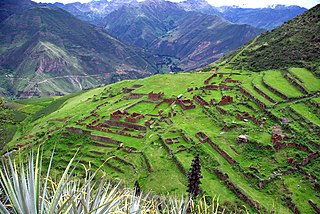| Sangarará | |
|---|---|
| District | |
| Country | |
| Region | Cusco |
| Province | Acomayo |
| Founded | November 23, 1861 |
| Capital | Sangarará |
| Government | |
| • Mayor | Herbert Luna Fernandez |
| Area | |
| • Total | 78.29 km2 (30.23 sq mi) |
| Elevation | 3,763 m (12,346 ft) |
| Population (2005 census) | |
| • Total | 3,657 |
| • Density | 47/km2 (120/sq mi) |
| Time zone | PET (UTC-5) |
| UBIGEO | 080207 |
Sangarará District is one of seven districts of the province Acomayo in Peru. [1]

The districts of Peru are the third-level country subdivisions of Peru. They are subdivisions of the provinces, which in turn are subdivisions of the larger regions or departments. There are 1,838 districts in total.

Acomayo Province is one of thirteen provinces in the Cusco Region in the southern highlands of Peru.

Peru, officially the Republic of Peru, is a country in western South America. It is bordered in the north by Ecuador and Colombia, in the east by Brazil, in the southeast by Bolivia, in the south by Chile, and in the west by the Pacific Ocean. Peru is a megadiverse country with habitats ranging from the arid plains of the Pacific coastal region in the west to the peaks of the Andes mountains vertically extending from the north to the southeast of the country to the tropical Amazon Basin rainforest in the east with the Amazon river.







